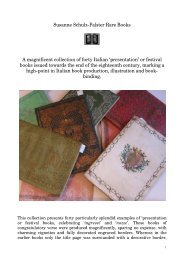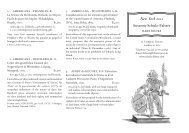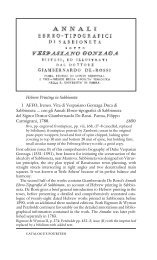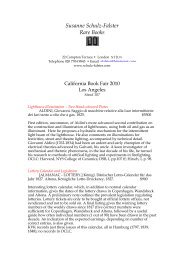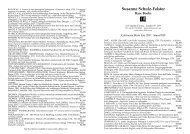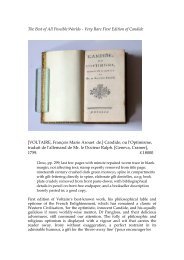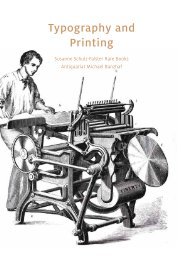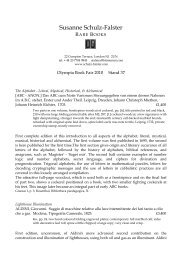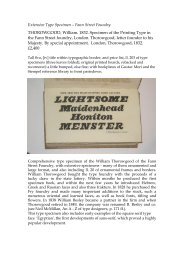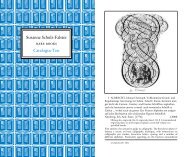«Merge Record #»«Title» - Schulz-Falster Rare Books
«Merge Record #»«Title» - Schulz-Falster Rare Books
«Merge Record #»«Title» - Schulz-Falster Rare Books
You also want an ePaper? Increase the reach of your titles
YUMPU automatically turns print PDFs into web optimized ePapers that Google loves.
The engraved frontispiece is particularly appealing, showing a 'salumeria' with<br />
numerous sausages, and hams suspended from the ceiling and a boar being<br />
slaughtered in the background. An elegant customer converses with the shopkeeper,<br />
and takes an appreciative whiff at a salami, while his dog is about to steal a sausage<br />
from the table.<br />
Bing 852; Lapiccirella 170; Simon 1342; Westbury p. 197.<br />
30.<br />
[GALIANI, Ferdinando.] Del Dialetto Napoletano. Naples, Vincenzo<br />
Mazzola-Vocola, 1779. £ 2800<br />
8vo, pp. 184; woodcut initials and head and tail-pieces; some light<br />
spotting and browning due to paper quality; paper fault to lower corner<br />
of title page; contemporary full vellum over boards, gilt-lettering<br />
directly to spine, a few small wormholes to spine, but an attractive copy.<br />
<strong>Rare</strong> first edition of the first scientific study of the Neapolitan dialect by the<br />
economist and enlightenment writer Galiani. He gives a detailed history and<br />
grammar of this dialect, which he maintains was the primitive language of Italy. In<br />
his preface Galiani stresses the importance of dialect and language as a patriotic<br />
bond, and means for preserving national heritage even in times of political and social<br />
turbulence. He defends the Neapolitan dialect against the influences of Tuscan<br />
Italian, and points to the importance of dialect poetry for Neapolitan literature. He<br />
begins with a general assessment of the characteristics of Neapolitan dialect and its<br />
grammar, covering syntax, spelling etc. In the second part he deals with origin of the<br />
language, and its changing fortunes. He covers Sicilian and Puglian language, and<br />
traces its influence in Italian. He gives numerous bi-lingual examples from Boccaccio,<br />
relevant glossaries, and concludes with a catalogue of works written in Neapolitan<br />
dialect.<br />
The second edition, published ten years later also included the beginnings of a<br />
dictionary of words unique to the Neapolitan dialect, later completed by Galiani's<br />
fellow academicians and entitled Vocabolario delle parole del dialetto napoletano,<br />
che più siscostano dal dialetto toscano, con alcune ricerche etimologiche sulle<br />
medesime degli Accademici Filopatridi.<br />
Ferdinando Galiani (1728-1787), a Neapolitan envoy to the Court of Paris, is better<br />
known as the author of Della Moneta, 'the best of many treatises published in Italy<br />
on money'. Galiani, who during his ten years in France had immersed himself in the<br />
ideas of the French enlightenment, but kept intact his Italian heritage, the ideas of<br />
Vico and Machiavelli, and his interest in the Italian language. He was an important<br />
figure in the principal salons of Paris, and was in close contact with the most<br />
influential figures of the time.<br />
Not in Zaunmüller, or Robert A. Hall, A bibliography of Italian linguistics, 1941, who<br />
only records the second edition (Hall 3357); OCLC records copies at Berkeley, Yale,<br />
Harvard, Maryland, Austin, Texas, Cornell and Oxford.



